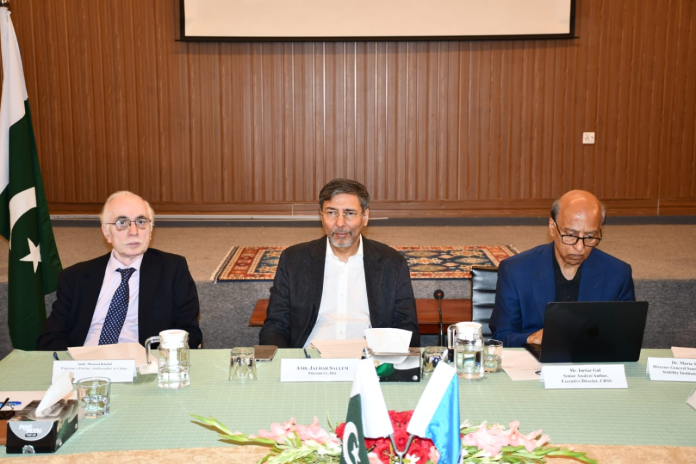ISLAMABAD, JUN 26 (DNA): The Institute of Regional Studies (IRS) launched a dialogue series titled “South–South Network of Policy Experts on China’s Global Security Initiative (GSI)” here in Islamabad on June 25, 2025. The session featured senior diplomats, academics, and policy experts from across the Global South. The inaugural session opened with welcome remarks by Ambassador Jauhar Saleem, who underscored the ongoing overlap of global crises and the failure of traditional zero-sum security structures. He emphasized that China’s Global Security Initiative (GSI) and Global Development Initiative (GDI) offer a compelling and coordinated alternative based on common, comprehensive, cooperative, and sustainable security, with Pakistan well-positioned to benefit through regional policy coordination and shared innovation.
Ambassador Masood Khalid, Pakistan’s former ambassador to China outlined China’s three key global initiatives, the Global Development initiative (GDI), Global Security Initiative (GSI) and Civilization Initiative (GCI) emphasizing their roots in China’s 5,000-year-old civilizational values of peace, mutual respect, and inclusive development. He viewed GSI as a Chinese quest for rejuvenation to reclaim its identity from the past. He elaborated on the six foundational principles of the GSI: respect for sovereignty and territorial integrity, adherence to the UN Charter, peaceful resolution of disputes, security through dialogue and cooperation, commitment to indivisible security, and opposition to unilateral sanctions or bloc confrontations. He stressed that China’s peaceful rise and commitment to multilateralism reflect a shift toward a multipolar world, where no single power can dictate the global order.
Building on this, Mahdi Mohammed Gulaid, a former Deputy Prime Minister of Somalia emphasized that South–South cooperation is not just relevant, it is imperative and timely framework driven by inclusive approach. He underscored that the South–South Network of Policy Experts is not only strategic but essential, enabling co-develop solutions grounded in shared experiences and collective insight. To guide the platform’s future, Mr. Gulaid proposed three priorities: bridging security and development, sharing policy innovations, and investing in institutional connectivity. He concluded by urging that the Global South must move from declarations to implementation of GSI through collaborative mechanisms.
Mr. Hussein Askari, who Iraqi-Swedish scholar and Vice-Chairman of the Belt and Road Institute in Sweden highlighted the crises in Gaza and Iran to stress that the world is at a crossroads between war and peace. He warned of a return to the law of the jungle if tensions go unmanaged. Citing GSI he highlighted symbiosis between security and development contrasting with the Western view that security must come first. He criticized the zero-sum nature of Western security models and praised China’s win-win approach, where resources are expanded through knowledge and science. He also commended China’s role in promoting peace in West Asia.
Commenting on this, Mr. Imtiaz Gul, Executive Director CRSS praised the GSI as a noble cause but argued that today’s fragmented international order is a challenge to its operationalization. He added that one of the key barriers to the execution of GSI is the incoherent governance model practiced in developing countries, as countries in the global south are unable to match the pace of Chinese development. The Chinese development is prospering because of the singularity in its power center, which enables the practice of policy in all segments of Chinese society.
Moreover, Dr. Huang Yunsong, Professor at Sichuan University began his remarks by framing GSI not merely as a harmonious vision, but as a strategic policy framework for a more just and peaceful world order. He criticized the militarized nature of the current global system, particularly NATO’s expansionist posture, and positioned the GSI as a peace-first alternative rooted in the de-westernization of global security norms. Emphasizing the need for institutionalizing the GSI, he advocated for its advancement through regional cooperation, highlighting the potential for resolving longstanding issues such as Kashmir, Afghanistan, and Middle Eastern conflicts through diplomacy. Dr. Huang called for the creation of Networks of Strategic Institutions to drive South–South cooperation for practical and action-oriented alternative.
Mr. Moises Lopes Dos Santos who is Director General of the International Cooperation Department at Guinea-Bissau’s Ministry of Foreign Affairs described GSI’s principles vital for international cooperation and effective diplomacy to deal with autonomous weapons race and armed conflicts. China is Africa’s second largest trading partner and partnership between them is a path to collective approach to security and economic development, he emphasized. China’s support to African Union Development Agency’s initiatives underlines its commitment to enhancing intelligence sharing and coordination against international terrorism and ensuring the security of sea lanes.
Finally, Maria Sultan, senior defense analyst and DG SAASI underscored that sovereignty remains the core determinant of whether development and security can coexist, especially for countries like Pakistan navigating fragile transitions. Sultan emphasized that joint defense efforts, such as those between Pakistan and China, have proven essential in containing conflict, but warned that economic development cannot advance without parallel security structures. Highlighting the threats of hybrid warfare and institutional decay, she urged for deeper knowledge transfer, institutional capacity, and a rethinking of South–South collaboration beyond rhetoric. She cautioned that although China’s initiative offers potential, it must demonstrate concrete impact in crisis zones and provide clear frameworks to shield the Global South from intensifying global pressures.

















